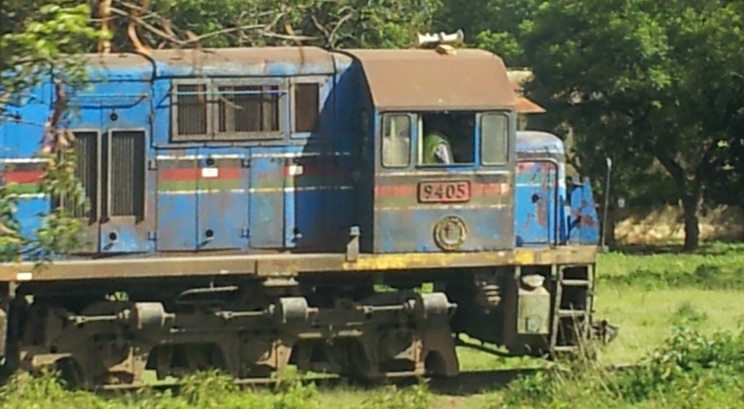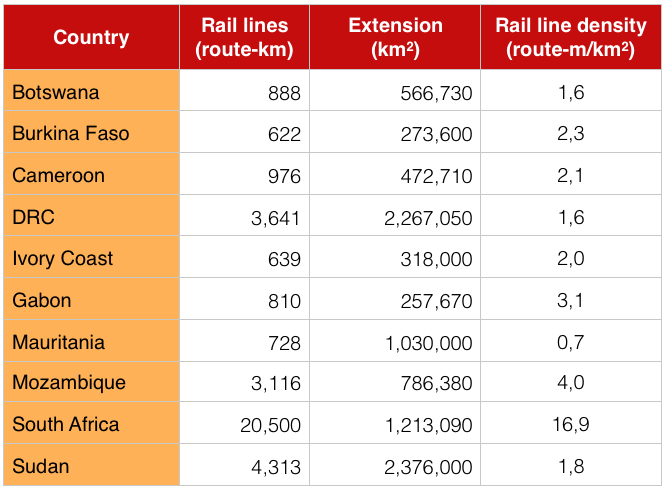I haven’t had the opportunity to travel by train in Africa. I guess that would be quite an experience! Most likely, an interesting combination of beauty, excitement, and cultural experience. One of the flagship projects of Agenda 2063 is the creation of an integrated high-speed train network that connects all African capitals and commercial centers in the continent. Such a network will facilitate movement of goods, people, and services.

What’s the current situation of railroad transport in sub-Saharan Africa? Let’s have a look at some data:
Reference points:
The information above is taken from data provided by the World Bank which are incomplete. For instance, Kenya’s railway system was built during colonial times. Nowadays, there’s a project to build a line to connect East African countries. None of this is included in the official statistics of the World Bank.
Not unexpectedly, South Africa stands out. It also stands out in terms of perceived quality of its railroad transport, according to the Global Enabling Trade Report 2014. Its famous high-speed Gautrain is a 80-km route for mass transportation in Johannesburg’s vicinity. I’ve used it as very safe transportation to the airport.
Still a long way to go to reach the goal to connect all capitals and commercial centers by high-speed train. But one step after another. As in many other areas, maybe Africa has the opportunity to leapfrog in rail transportation and jump directly to high-speed trains . Hopefully, this will contribute boosting economic activity in ways that don’t leave behind the underprivileged. Quite the contrary, by improving the movement of goods, I hope these investments will result in an increased integration for all.
Related posts:




Hi Africa,
very interesting your approach to the transportation factor in the development of the continent.
I believe that it will be possible, if governments, political parties, railway companies and the hole society put the adequate resources in achieving that objective.
Hard task but achievable. We have many examples how in developed economies railway transport infrastructures changed the way to make business.
Thank you, Jose-Pedro. Yes, the potential is there to boost business. Hopefully, the necessary resources will be dedicated. Also, railroad transportation has to be looked at as an element of the overall transportation structure — in particular air transport. This is another flagship project in Agenda 2063.
Very interesting. Not sure however that high-speed trains should be a priority given the difficulty to compete with air transport. I think that the priority should be given to the transport of goods, in particular mining products, certainly in the case of a country such as DRC.
MHR
I agree with you, Marc-Henry. Also, air transport is a more flexible structure than railroads.
Great post! The creation of high-speed train network that connects African commercial centers will definitely boost economic activities. I personally think that money is not the major obstacle. Africa is a very rich continent. Africa is full of natural resources, wonderful landscapes, and sunny beaches. It should success in all economic fields. The major obstacle is spreading democracy. This is, in my opinion, the fundamental key to economic success.
Thank you for sharing your insights.
Thank you for your comment, Khaled. I think it might be better to create a few regional networks. It’s a matter of making calculations, but I can’t picture a railroad crossing the Sahara dessert…
We are all happy about the thought of high speed rail, the only down side is how this will affect the animals in the wild. For Kenya, Tsavo and Nairobi National parks have been affected. There needs to be a clear guide line so that we don’t loose one and gain another.
That is very thoughtful, David. A colleague from Kenya told me once that we Europeans have lost touch with nature. Maybe that’s why I didn’t think of this. Thanks for bringing it up!